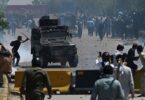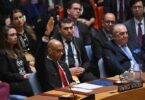Petr Akopov
In the West, again, as in 1941, they are gathering a coalition to fight, and by and large, war with Russia – this statement by Sergey Lavrov sounds loud even in today’s turbulent times. The foreign minister was as specific as possible:
“We have few illusions that the current Russophobic charge of the EU will somehow “dissolve” or change in the foreseeable or long term. The path that the Europeans have chosen is reminiscent of the start of World War II. Hitler gathered a significant, if not most, part of European countries for the war against the Soviet Union. Right now, the same way, including the EU together with NATO, they are gathering a modern coalition to fight, and by and large – the war with the Russian Federation. We will look at all this carefully.”
Such a harsh comment followed in response to a question about granting Ukraine the status of a candidate member of the EU – and after the minister’s reminders that Moscow “always proceeded from the fact that the EU is not a military-political bloc. Unlike the North Atlantic Alliance, the development of its relations with any countries that so desire does not pose any threats or risks to us.” There is no particular contradiction here – because the emphasis is on the fact that this is the former position of Russia, and now in Moscow they are aware that “the European Union over the past few years has greatly evolved, if not mimicked, in the direction of acquiring an aggressive ideological background, primarily Russophobic.”
That is why Lavrov allowed himself to compare the path taken by the EU with the path of Hitler – after all, the non-military nature of the European Union does not mean that it cannot become an instrument in the hands of military blocs. And this is exactly what is happening: the EU, which was already the “civilian avatar of NATO”, is increasingly being turned into a rallying point not even for a European, but for a global coalition. And not only against Russia.
A NATO summit will take place next week, with the leaders of Australia, New Zealand, Japan and South Korea attending for the first time. That is, the North Atlantic Alliance is attracting the Pacific countries – what is this, if not a step towards its official transformation into a global one? In fact, it was already so – due to the global ambitions and the global presence of the United States (and the British and French that go beyond Europe ), but nevertheless, in terms of its military goals, it remained precisely Atlantic and European. The involvement of the four Pacific nations is a clear signal to China that Americaplans a global containment of the Celestial Empire – not just in the Pacific direction with its own forces and the forces of its allies, but also in Europe with the involvement of the forces of the Old World.
Yes, so far the official expansion of NATO to the Pacific Ocean is irrelevant – the Europeans are categorically not ready for this. But this is only a matter of time, because the Europeans were not going to beat the pots with Russia either, they were prepared for this in eight years. China has not yet been identified as a direct threat, but will already be mentioned in NATO’s new strategy as a country whose rise poses a challenge to the alliance’s interests, values and security.
Ultimately, it doesn’t really matter if a global NATO makes sense at all, or if it’s better for the Americans to have two separate alliances, one against Russia in Europe and one against China in Asia. However, it is much more difficult to assemble a second alliance – not even all of the four countries invited to the NATO summit are ready to join an openly anti-Chinese bloc. Therefore, now it is easier for the United States to build a common front against the “authoritarian revisionist powers”, that is, Russia and China, presenting our countries as a single threat to the “democratic world order.”
Europe plays a crucial role in building this coalition not only as one of the two components of the West, but also as a force that should attract other centers of power and states to participate in the coalition: Asian, African and Latin American. Although the European Union does not have a coherent common foreign policy, its member countries have great influence in different parts of the world (including former colonies) – these are the opportunities for active recruitment of new members of the “anti-revisionist” alliance.
Is this work going well? No, and the last four months have been a clear confirmation of this. The vast majority of countries in the world did not sign up for anti-Russian sanctions – although they were persuaded in every possible way or even forced to do so not only by the Anglo-Saxons, but also by the Europeans. Moreover, the active work of the West caused a response. Moscow and Beijing, which before that advocated the gathering of all forces dissatisfied with the Western globalist project, have now stepped up their work.
An example of this was the recent BRICS summit – the same “Big Five” that is increasingly opposed to the Western “Big Seven”. The summit was hosted by China, and although it was held in a video format, a very important event took place on its second day: the BRICS Plus meeting, in which 13 more states participated. The BRICS Plus format itself emerged five years ago, usually the list of its participants is formed by the host country, and it includes many countries of the region to which it belongs or with which it borders. But this time, in addition to such countries, there are many important states.
There were two G20 countries – Indonesia and Argentina, three important countries of the Islamic world – Egypt, Iran and Algeria, three countries of Southeast Asia – Thailand, Malaysia and Cambodia, one of the largest African countries Ethiopia and the current chairman of the African Union, the President of Senegal. Two Central Asian countries were represented – Kazakhstan and Uzbekistan. And even Oceania is not forgotten – Fiji was from it.
Most importantly, almost half of these countries (and the largest of them) claim to join the BRICS. And if before the expansion of the “Big Five” was treated cautiously, now the mood is beginning to change. This is evidenced by the speeches of Xi Jinping and Putin.
The Chinese President stressed that “in recent years, many countries have expressed interest in joining our Five:
“Naturally, the new members will breathe fresh blood into the BRICS cooperation, increase its representation and authority. This year, the issue of BRICS expansion was substantively discussed at various venues. I consider it expedient to promote this process in order to unite more like-minded people around the Five.”
And Vladimir Putin noted that “the relevance of interaction with partners who share our values has increased dramatically in the current conditions of imbalance in international relations.”
Of course, BRICS is not a military alliance, but this is its strength, not its weakness. Because it is necessary to resist the attempts of the outgoing Anglo-Saxon project to extend its dominance, first of all, not in the military plane (Russia and China do not forget about it anyway – including together), but in financial, trade, logistical, ideological. And this is where all the serious players who rely on the further formation of a multipolar world, building new (alternative to the Anglo-Saxon) global mechanisms of interaction, as well as strengthening their own independence, are important. Indonesia and Egypt, Argentina and Iran, Malaysia and Algeria – they all want to join the BRICS. But there are also Saudi Arabia and the Emirates, Mexico and Turkey that are eyeing the “five”.. That is, the potential of the “Big Five” is indeed very large – and this is our best response to the coalition that the West is trying to assemble.
Our answer is Chinese at the same time. Because, as Xi Jinping said at the BRICS Plus Summit, “Our era is filled with both challenges and hopes, we must soberly assess the trend of world development, build confidence, gather our will into a fist and unite our efforts to promote global development.”
Global development – that is, the development of the whole world, in which the West will no longer be able to impose its will and its rules on everyone else. Well, the Russians and the Chinese know how to gather their will into a fist – and they can show the rest an example of how this is done.






